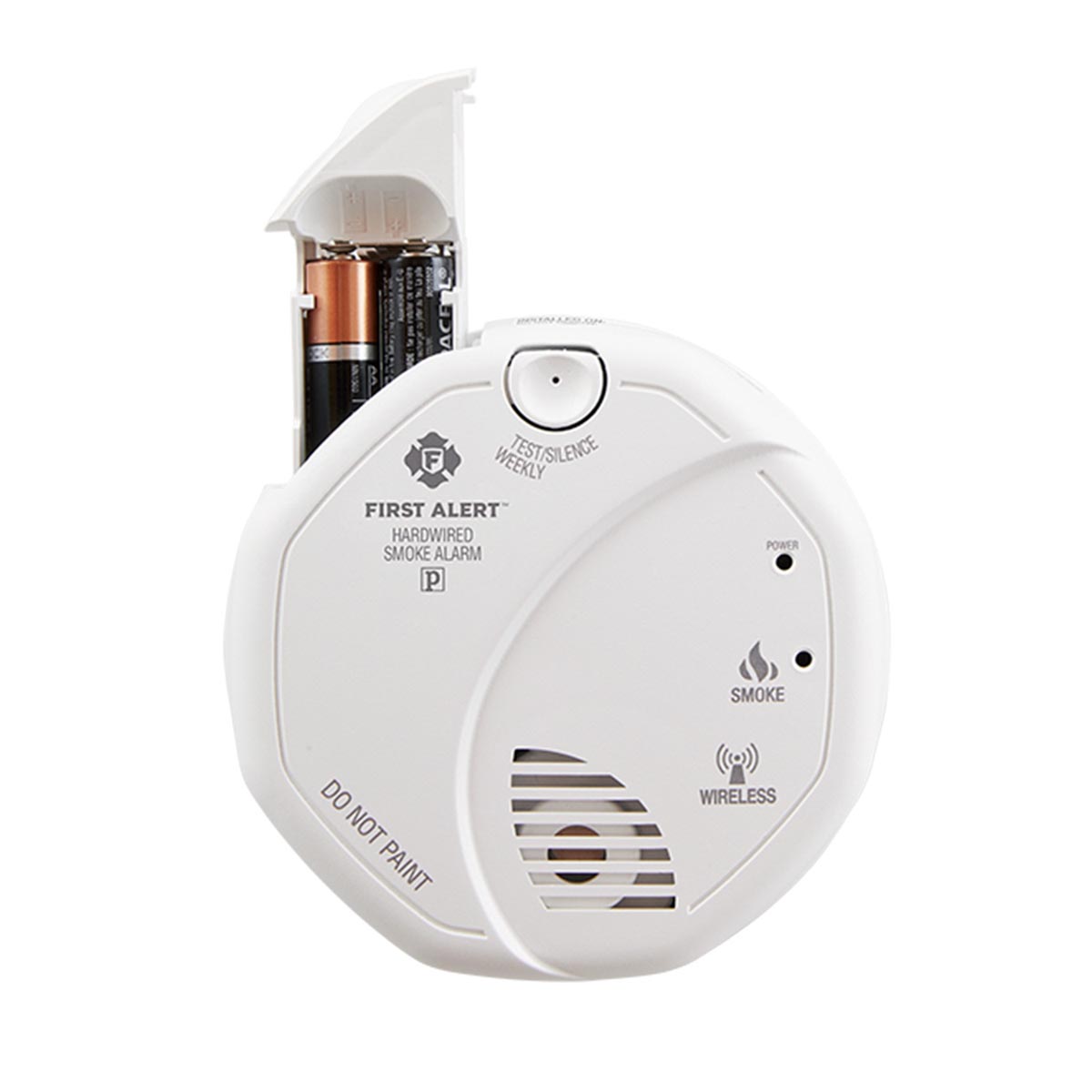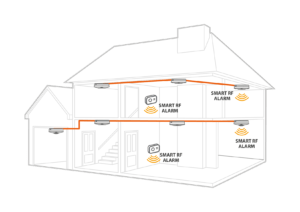Can You Mix Wired and Wireless Smoke Detectors? Find Out!
You can mix wired and wireless smoke detectors in a single system. Compatibility depends on the specific models and system configurations.
Ensuring the safety of your home is paramount, and smoke detectors play a crucial role in this endeavor. With advancements in technology, homeowners now have the option to choose between wired and wireless smoke detectors. Many wonder whether these two types can work in tandem.
The good news is that mixing them is often possible, allowing for a customized approach to fire safety. This integration can offer installation flexibility and expand coverage without extensive wiring. Before combining different types of smoke detectors, it is essential to consult with professionals or refer to the manufacturers’ guidelines to ensure proper functionality and maintain the reliability of your fire alarm system.
Introduction To Smoke Detectors
Smoke detectors are critical for home safety. They alert you to fires, giving you time to escape. Over the years, smoke detectors have evolved. Now, you can choose between wired and wireless systems. Can they work together? Let’s explore.
Importance Of Fire Safety
Fire safety saves lives. Smoke detectors play a big role. They detect smoke early. This gives everyone time to leave the house safely.
- Early warnings reduce fire deaths.
- Smoke detectors should be in every home.
- Test them monthly for proper function.
Evolution From Wired To Wireless
Smoke detectors started with wires. Now, wireless technology is common. Wireless detectors are easier to install. They can talk to each other without wires.
| Year | Type | Feature |
|---|---|---|
| 1970s | Wired | Hardwired to electricity |
| 2000s | Wireless | Battery-powered, easy setup |
Today, many wonder if wired and wireless can mix. The answer is yes. They can work together to protect your home.


Credit: www.firstalertstore.com
Types Of Smoke Detectors
Understanding the Types of Smoke Detectors is crucial for your safety. Let’s dive into the different kinds available. This will help you make the best choice for your home.
Ionization Vs. Photoelectric
Ionization and Photoelectric are two main types of smoke detectors. Each works differently to detect fires.
- Ionization smoke detectors are quick to catch fast, flaming fires. They do this by using a small amount of radioactive material.
- Photoelectric smoke detectors excel at sensing slow, smoldering fires. They use a light source in a sensing chamber.
For the best protection, experts suggest using both types in your home.
Wired Systems
Wired smoke detectors connect directly to your home’s electrical system. They often include a battery backup for power outages. These systems can link together. When one alarm goes off, all alarms sound. This feature is great for large homes.
Wireless Systems
Wireless smoke detectors do not need wires to connect. They use radio frequency to communicate. Like wired systems, all alarms will sound when one alarm detects smoke. This setup is easier to install, especially in existing homes or places where running wires is difficult.
| Type | Best For | Installation |
|---|---|---|
| Ionization | Fast fires | Easy |
| Photoelectric | Slow fires | Easy |
| Wired | Large homes | Professional |
| Wireless | Any home | DIY |
Choosing the right type of smoke detector is a step towards a safer home. Consider your home’s needs before deciding. Remember, using both ionization and photoelectric detectors offers the best protection.
Pros And Cons Of Wired Smoke Detectors
Today, we explore the Pros and Cons of Wired Smoke Detectors. These devices play a crucial role in keeping homes safe. Let’s dive into their advantages and disadvantages.
Reliability And Power Source
Wired smoke detectors are highly reliable. They connect directly to your home’s electrical system. This means they are always powered on. You don’t have to worry about changing batteries often.
Yet, they have a backup battery. This battery keeps the detector working during power outages. So, your home stays safe all the time.
- Always powered: No regular battery changes are needed.
- Backup battery: Keeps working during power outages.
Installation Complexity
Installing wired smoke detectors can be complex. It often requires professional help. This is because it involves electrical wiring. The process might also need drilling into walls and ceilings.
This complexity can increase the installation cost. Yet, once installed, they offer long-term reliability.
- Professional installation: This may be required due to wiring.
- Higher initial cost: But it offers long-term peace of mind.
Pros And Cons Of Wireless Smoke Detectors
Exploring the world of smoke detectors reveals a variety of options. Among these, wireless smoke detectors stand out for their modern features and convenience. Let’s dive into some of their advantages and limitations.
Ease Of Installation
Wireless smoke detectors offer a hassle-free installation process. Unlike wired models, they do not require complex wiring or professional help. Homeowners can easily place them anywhere in their homes. This flexibility makes them ideal for those who prefer a quick and simple setup.
Battery Life Considerations
Wireless smoke detectors rely on batteries to function. Regular battery checks are a must to ensure safety. Most models alert users when battery levels are low. Yet, forgetting to replace batteries can lead to non-functional detectors. To avoid this, mark your calendar for routine battery replacements.
- Simple to install, no wires needed
- Can be placed in various locations
- Require frequent battery checks
- Low battery alerts help with maintenance
The Possibility Of Mixing Systems
Many homeowners ponder the feasibility of integrating wired and wireless smoke detectors. This blending could offer flexibility and enhanced safety. Yet, challenges exist.
Compatibility Issues
Wired and wireless smoke detectors have distinct designs. Their power sources differ. Wired units connect to home electrical systems. Wireless detectors rely on batteries. These differences affect compatibility.
Before mixing systems, confirm that devices can communicate. Some brands may not work together. Check manufacturer guidelines to ensure compatibility.
Communication Protocols
Smoke detectors use specific protocols to communicate. Wired systems often use electrical wiring for signals. Wireless units use radio frequencies.
A bridge device may be necessary to mix systems. This device translates signals between wired and wireless detectors. Without this, the systems cannot connect.
- Check: Do existing alarms support mixed systems?
- Research: Required bridge devices for integration.
- Plan: A professional installation for complex setups.
How To Integrate Wired And Wireless Detectors
Many people wonder, can you mix wired and wireless smoke detectors? Yes, you can. This guide will show you how to integrate wired and wireless detectors effectively. Keeping your home safe is crucial. By combining these systems, you enhance safety.
Bridging Devices
First, let’s talk about bridging devices. These devices connect wired and wireless systems. They are the key to integration. You need one that supports both systems. Check the device’s compatibility before buying.
- Choose a compatible bridging device.
- Install it according to the manual.
- Test the connection.
System Synchronization
Next is system synchronization. All detectors must work together. This ensures your home’s safety. Follow these steps for smooth synchronization:
- Check all detectors for compatibility.
- Use the bridging device to connect systems.
- Test the setup. Make sure all detectors are alert together.
This integration boosts your home’s safety. It ensures no alarm goes unnoticed. Remember, always consult a professional for installation. Safety first!
Safety Precautions And Best Practices
Integrating wired and wireless smoke detectors can enhance safety in your home. It’s vital to follow certain safety precautions and best practices. These ensure your system works effectively. Let’s delve into the specifics of maintaining your smoke detectors. Doing so keeps your home safe from fire hazards.
Regular Maintenance
Keeping smoke detectors in top condition is key. Regular checks are a must. Follow this simple checklist:
- Test all units monthly.
- Replace batteries in wireless detectors annually.
- Clean detectors to prevent false alarms.
- Ensure signals between devices are uninterrupted.
Compliance With Safety Standards
Adhering to safety standards is crucial. Use detectors that meet industry certifications. This guarantees their reliability. Check the following:
| Standard | Description |
|---|---|
| UL 217 | For smoke alarms |
| UL 268 | For fire detectors |
| NFPA 72 | For alarm signaling |
Also, check local codes for installation requirements. Professional installation ensures proper setup.


Credit: www.fireangel.co.uk
Case Studies And Real-life Implementations
Smoke detectors are critical for safety in homes and businesses. Many wonder if mixing wired and wireless types works. Let’s look at real-life cases to learn from successes and address challenges.
Residential Success Stories
A family in Texas upgraded their safety system. They combined wired and wireless smoke detectors. The results were impressive.
- Integration: The new system worked without issues.
- Cost-effective: They saved money by not rewiring the entire house.
- Peace of mind: They felt safer knowing their system was reliable.
In California, another success was reported. A couple installed wireless detectors alongside their old wired ones. They now enjoy extended coverage.
Challenges In Commercial Settings
In commercial spaces, the mix poses unique challenges. A mall in Florida faced difficulties. Their wireless units had interference from other devices.
| Challenge | Solution |
|---|---|
| Interference | Updated to frequency-hopping tech |
| Consistency | Regular system checks |
| Integration | Professional installation |
A hotel in New York also struggled with system compatibility. They overcame this by consulting experts. The experts ensured all detectors communicated well.
Future Of Smoke Detection Technology
The landscape of smoke detection technology is evolving rapidly. Traditional smoke detectors are getting smarter, blending into the interconnected fabric of modern homes. As we look to the future, the integration of both wired and wireless systems is not just a possibility but a reality. This evolution ensures enhanced safety, convenience, and control for users around the globe.
Smart Home Integration
The rise of smart homes has revolutionized smoke detection. Wired and wireless smoke detectors now work together seamlessly. Users control and monitor their home safety systems from anywhere. This connectivity brings peace of mind to homeowners.
- Real-time alerts sent to smartphones
- Easy system status checks on the go
- Smoke detectors sync with other smart devices
Innovations On The Horizon
Exciting advancements are shaping the future of smoke detection. Innovations focus on increased accuracy and quicker responses. Expect to see:
| Feature | Benefit |
|---|---|
| AI-Powered Detection | Reduces false alarms, identifies types of smoke |
| Wireless Mesh Networks | Improves connectivity, no single point of failure |
| Longer Battery Life | Less maintenance, more reliable |
These innovations ensure the safety of people and property. They make smoke detectors smarter and more efficient. The blend of wired and wireless technologies paves the way for a safer tomorrow.
Credit: support.firstalert.com
Frequently Asked Questions
Can I Mix Hardwired And Battery Smoke Detectors?
Yes, you can mix hardwired and battery-operated smoke detectors. Ensure compatibility and interconnectivity for proper function and safety alerts.
How Do You Connect Wired And Wireless Smoke Detectors?
First, install wired and wireless smoke detectors according to the manufacturer’s instructions to connect them. Then, pair wireless units using the sync button, and interconnect wired detectors with compatible wiring. Ensure all detectors communicate for unified alerts.
Can You Replace A Wired Smoke Detector With A Wireless?
Yes, you can replace a wired smoke detector with a wireless one, but ensure compatibility with your home’s system and follow manufacturer instructions for installation.
Conclusion
Wrapping up, and combining wired and wireless smoke detectors is indeed possible. This approach enhances safety and ensures coverage in every corner of your home. Remember to consult professionals and adhere to local codes for optimal results. Protecting your house from fire hazards just got more flexible and efficient.




